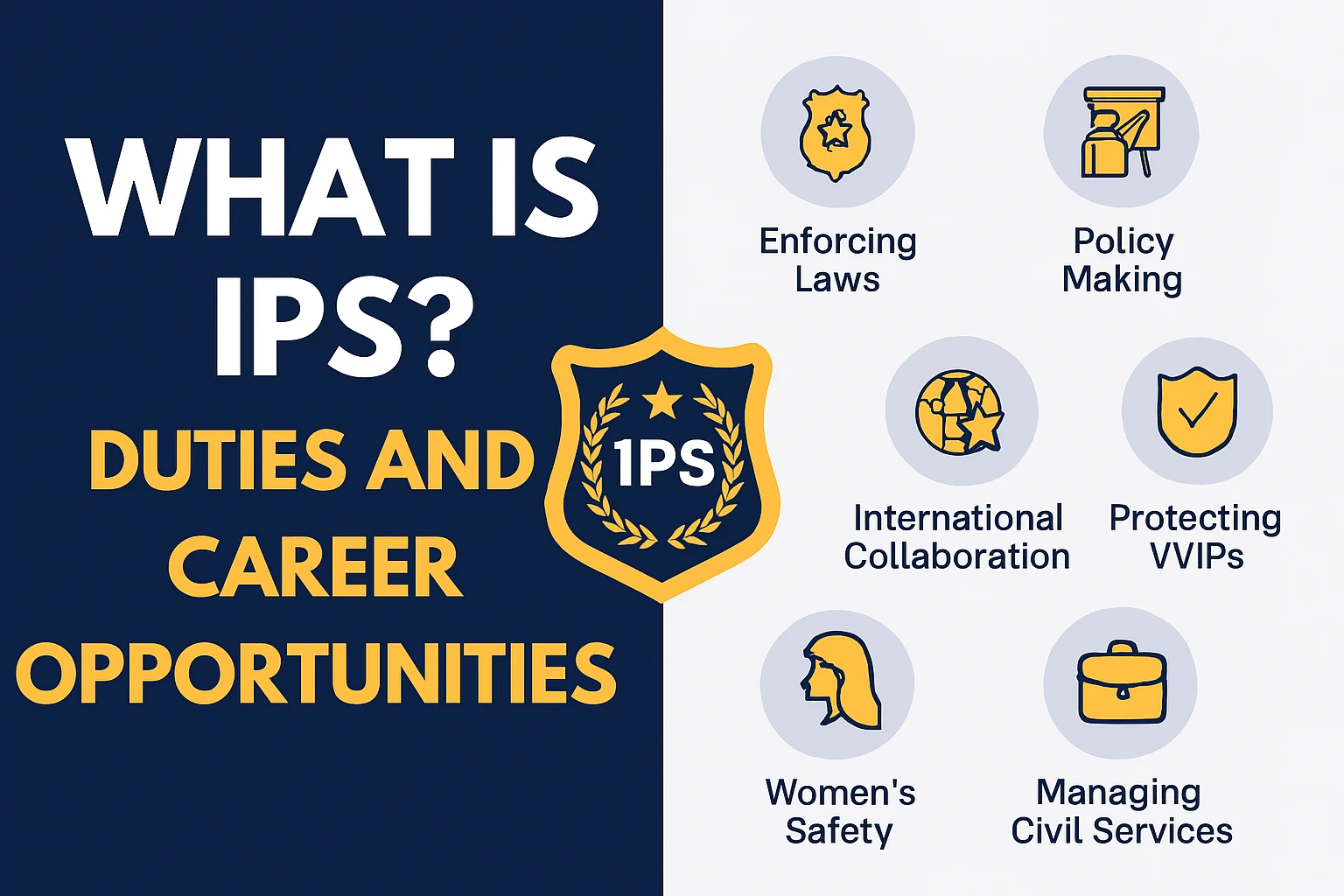Introduction: The Prestige of the Indian Police Service (IPS) in 2026
In 2026, as India navigates a complex landscape of rapid urbanization, technological advancements, and evolving security threats, the Indian Police Service (IPS) stands as a cornerstone of the nation’s law enforcement framework. Moreover, these officers are not just law enforcers; they serve as leaders, strategists, and guardians of public safety, tackling challenges from cybercrime to terrorism. Recruited through the highly competitive Union Public Service Commission (UPSC) Civil Services Examination (CSE), IPS officers wield authority and responsibility in equal measure. Consequently, this comprehensive guide delves into what the IPS is, its multifaceted duties, the diverse career opportunities it offers, and a detailed roadmap for aspiring officers in 2026. Ultimately, whether you’re a student, a professional seeking a career shift, or simply curious, this article will equip you with everything you need to know about this prestigious service.
Table of Contents

What Is the Indian Police Service (IPS)?
The Indian Police Service (IPS) is one of the three All-India Services, alongside the Indian Administrative Service (IAS) and Indian Forest Service (IFoS), established under Article 312 of the Indian Constitution. Managed by the Ministry of Home Affairs, the IPS is a central service that provides leadership to state police forces, central agencies, and specialized units. Furthermore, in 2026, this service is adapting to modern challenges, integrating technology and data-driven policing to address cyber threats and public safety demands.
- Historical Context:
- Originated as the Imperial Police Service during British rule, it was restructured post-independence in 1948.
- Governed by the All-India Services Act, 1951, it ensures a unified framework across states.
- Structure:
- Officers are allocated to state cadres but can be deputed to central agencies like the Central Bureau of Investigation (CBI), Intelligence Bureau (IB), or National Investigation Agency (NIA).
- Ranks range from Assistant Superintendent of Police (ASP) to Director General of Police (DGP).
- Selection Process:
- Recruited via the UPSC CSE, a three-stage exam (Prelims, Mains, Interview) known for its rigor.
- In 2026, the exam pattern remains consistent, with potential minor updates to reflect digital policing trends.
- Training:
- Conducted at the Sardar Vallabhbhai Patel National Police Academy (SVPNPA) in Hyderabad.
- It includes physical fitness, legal studies, and emerging areas like cybercrime investigation.
Thus, the IPS represents a dynamic career path, blending tradition with innovation to meet India’s evolving security needs in 2026.
Key Duties of an IPS Officer
In 2026, officers in the IPS are tasked with a broad spectrum of responsibilities, reflecting the complexities of modern policing. For instance, their roles combine operational leadership, strategic planning, and community engagement, with a growing emphasis on technology-driven solutions.
Maintaining Law and Order
- Firstly, they oversee public safety during festivals, protests, elections, or emergencies.
- Additionally, they deploy real-time monitoring tools, such as CCTV and drones, to manage crowds and prevent disturbances.
- Moreover, they address communal or regional tensions to ensure social harmony.
Crime Prevention and Investigation
- Secondly, they lead investigations into serious crimes, including murder, terrorism, and cyber fraud.
- Furthermore, they coordinate with forensic teams, cyber cells, and intelligence units for evidence-based outcomes.
- Also, they utilize data analytics and AI tools to identify crime patterns and predict threats.
Public Safety and Security
- Next, they ensure protection for VIPs, critical infrastructure, and public events.
- In addition, they implement measures to combat human trafficking, drug smuggling, and organized crime.
- Moreover, they oversee disaster response, coordinating with agencies like the NDRF.
Leadership and Administration
- Furthermore, they manage police stations, districts, or state police forces, ensuring operational efficiency.
- Also, they formulate policies to modernize policing, such as adopting digital case management systems.
- Additionally, they train and mentor subordinate officers, emphasizing ethical conduct and professionalism.
Counter-Terrorism and Intelligence
- Moreover, they collaborate with central agencies (e.g., NIA, IB) to counter terrorism and insurgencies.
- In addition, they analyze intelligence data to prevent threats, using advanced surveillance technologies.
- Furthermore, they participate in national security strategy formulation.
Community Engagement and Reforms
- Also, they build trust through community policing initiatives, such as women’s safety campaigns.
- Additionally, they address public grievances via digital platforms and in-person outreach.
- Finally, they implement 2026 reforms focusing on transparency and accountability, as emphasized in recent policy discussions.
Therefore, these duties require a blend of courage, strategic thinking, and adaptability, especially as policing integrates digital tools in 2026.
Career Opportunities in the IPS
The IPS offers a rewarding career with diverse roles, competitive benefits, and significant growth potential. Additionally, in 2026, opportunities are expanding in tech-driven and specialized domains, reflecting India’s focus on modern policing.
Career Progression
- Entry Level (0–5 years): Initially, officers start as Assistant Superintendent of Police (ASP) or Deputy Superintendent of Police (DSP), managing district-level operations.
- Mid-Level (5–14 years): Subsequently, they progress to Superintendent of Police (SP), Senior SP, or Deputy Inspector General (DIG), overseeing larger jurisdictions or specialized units.
- Senior Level (20–30 years): Eventually, they reach Inspector General (IG), Additional Director General (ADG), or Director General of Police (DGP), leading state police or central agencies.
Diverse Roles
- State Police Services: Primarily, they lead district or state-level operations, focusing on local law enforcement.
- Central Agencies: Alternatively, they serve in the CBI (crime investigation), IB (intelligence), RAW (external intelligence), or NIA (counter-terrorism).
- Specialized Units: Additionally, they work in cybercrime cells, anti-narcotics task forces, or elite units like the National Security Guard (NSG).
- International Assignments: Furthermore, they join UN peacekeeping missions or Interpol, representing India globally.
Emerging Opportunities in 2026
- Cyber Policing: Specifically, they lead initiatives to combat cyber fraud, hacking, and online trafficking.
- Smart Policing: Moreover, they implement AI-driven predictive policing and digital case management.
- Policy Roles: Additionally, they contribute to national security policies or police reform initiatives.
Benefits
- Salary: Initially, the starting basic pay is ~₹56,100/month for ASP (7th Pay Commission, 2026). The 8th Pay Commission, expected in 2026, may increase salaries significantly (details pending).
- Allowances: Furthermore, they receive Dearness Allowance (DA), House Rent Allowance (HRA), travel allowances, and medical benefits.
- Perks: Additionally, they enjoy government housing, official vehicles, security, and pension benefits.
- Professional Growth: Moreover, they gain access to advanced training, awards (e.g., President’s Police Medal), and international exposure.
Challenges
- First, high-pressure environments with long hours and public scrutiny.
- Second, balancing operational demands with administrative responsibilities.
- Third, navigating complex socio-political dynamics in diverse regions.
Rewards
- First, prestige and authority as a senior civil servant.
- Second, the opportunity to shape public safety and national security.
- Third, lifelong learning through training and real-world experience.
How to Become an IPS Officer in 2026
Becoming an IPS officer requires dedication, strategic preparation, and resilience. Below is a detailed roadmap for 2026 aspirants.
Step 1: Meet Eligibility Criteria
- Educational Qualification: First, a bachelor’s degree from a recognized university (any discipline, e.g., arts, science, engineering).
- Age Limit: Second, 21–32 years as of August 1, 2026. Relaxations:
- OBC: +3 years (up to 35).
- SC/ST: +5 years (up to 37).
- PwD: +10 years (up to 42).
- Nationality: Third, Indian citizenship is mandatory for IPS.
- Physical Standards: Fourth, minimum height (men: 165 cm, women: 150 cm, relaxations for certain categories); chest girth (men: 84 cm, expandable to 89 cm); vision requirements.
- Attempts: Finally, General: 6; OBC: 9; SC/ST: Unlimited (within age limit).
Step 2: Prepare for the UPSC CSE
Furthermore, the UPSC CSE is a three-stage exam requiring comprehensive preparation. In 2026, the syllabus is expected to remain consistent, with minor updates to reflect current affairs and technology.
- Syllabus Overview:
- Prelims: Initially, two papers (400 marks total):
- General Studies (GS): History, polity, geography, economy, science, environment, current affairs (200 marks, cutoff-based).
- CSAT: Aptitude, comprehension, logical reasoning (200 marks, 33% qualifying).
- Mains: Subsequently, nine papers (1750 marks):
- Essay, four GS papers (polity, economy, ethics, etc.), two optional subject papers, and two language papers (qualifying).
- Interview: Finally, a personality test (275 marks).
- Prelims: Initially, two papers (400 marks total):
- Preparation Tips:
- Resources: First, NCERT books (Class 6–12), newspapers (The Hindu, Indian Express), standard references (e.g., Laxmikanth for polity, Spectrum for history).
- Optional Subject: Second, choose based on interest and scoring potential (e.g., Public Administration, Sociology, Geography).
- Current Affairs: Third, follow monthly magazines (Yojana, Kurukshetra) and online platforms for 2026 updates.
- Mock Tests: Fourth, practice prelims and mains test series to build speed and accuracy.
- Study Plan: Finally, dedicate 6–8 hours daily for 12–18 months, balancing static and dynamic topics.
Step 3: Clear the UPSC Exam
- Prelims: First, held in May/June 2026, objective format. Clear GS cutoff (typically 90–110 marks).
- Mains: Second, conducted in September/October 2026, descriptive format. Score high to rank in top 200–300 for IPS.
- Interview: Third, held in early 2027, assesses leadership, ethics, and decision-making. Final merit list determines service allocation.
Step 4: Training at SVPNPA
UPSC CSE Process Timeline (2026)
- Duration: First, a 1-year program at SVPNPA, Hyderabad.
- Components:
- Physical Training: Initially, fitness drills, weapon handling, and self-defense.
- Academic Training: Subsequently, criminal law, IPC, CrPC, evidence act, and cyber laws.
- Field Training: Furthermore, practical exposure to policing operations.
- 2026 Focus: Finally, enhanced modules on digital forensics, AI in policing, and community engagement.
- Outcome: Ultimately, prepares officers for real-world challenges with a tech-forward approach.
Step 5: Launch Your IPS Career
- First, start as an ASP or DSP in a state cadre, with opportunities for central deputation after initial service.
- Second, progress through ranks based on performance, seniority, and annual appraisals.
Why Choose a Career in IPS in 2026?
Moreover, the IPS offers a unique blend of challenges and rewards, making it ideal for those passionate about public service and leadership.
- Social Impact: First, ensure justice, safety, and equality across diverse communities.
- Leadership Opportunities: Second, shape policies and lead teams at state or national levels.
- Job Security: Third, a stable government career with competitive benefits.
- Emerging Trends: Fourth, lead in cyber policing, smart cities, and national security reforms.
- Personal Growth: Finally, develop skills in crisis management, decision-making, and public engagement.
Challenges and Considerations
- Work-Life Balance: First, long hours and high-pressure situations are common.
- Public Scrutiny: Second, officers face media and societal expectations.
- Ethical Dilemmas: Third, balancing law enforcement with human rights requires judgment.
- Safety Risks: Finally, roles in sensitive areas or counter-terrorism involve personal risk.
Frequently Asked Questions (FAQ)
Below are answers to common questions about the IPS and UPSC CSE for 2026 aspirants:
- What is the difference between IPS and IAS?
IPS officers focus on law enforcement, public safety, and security, while IAS officers handle general administration and policy implementation. Both are All-India Services, but IPS requires specific physical standards and focuses on policing.
- Can I become an IPS officer without a science background?
Yes, a bachelor’s degree in any discipline (arts, commerce, science, etc.) from a recognized university is sufficient. The UPSC CSE tests general knowledge and aptitude, not specific academic fields.
- How tough is the UPSC CSE for IPS?
Additionally, the UPSC CSE is highly competitive, with ~10 lakh applicants annually and only ~200–300 securing IPS. Success requires 12–18 months of dedicated preparation, focusing on both static and current affairs topics.
- What is the salary of an IPS officer in 2026?
The starting basic pay for an ASP is ~₹56,100/month (7th Pay Commission, 2026), plus allowances (DA, HRA, etc.). The 8th Pay Commission, expected in 2026, may increase salaries, but details are pending.
- What are the physical requirements for IPS?
Minimum height: Men (165 cm), Women (150 cm, relaxations for certain categories). Chest (men): 84 cm, expandable to 89 cm. Vision: 6/6 or 6/9 without glasses for better eye; color blindness is disqualifying.
- Can I choose my state cadre in IPS?
Cadre allocation is determined by UPSC based on rank, preference, and availability. Candidates can indicate preferences, but final allocation may vary.
- What is the role of technology in IPS duties in 2026?
Technology is integral, with officers using AI, data analytics, and digital forensics for cybercrime investigations, predictive policing, and real-time monitoring.
- How can I start preparing for UPSC CSE 2026?
Begin with NCERT books (Class 6–12), read newspapers daily (The Hindu, Indian Express), and join a test series. Create a 6–8 hour daily study plan, balancing prelims and mains preparation.
For additional queries, visit upsc.gov.in or consult official resources.
Conclusion
In 2026, the Indian Police Service remains a prestigious and impactful career, amplified by technological advancements and evolving security needs. From leading cybercrime units to shaping national policies, IPS officers are at the forefront of India’s safety framework. Aspiring to join? Start your journey with UPSC preparation, leveraging resources at upsc.gov.in. With dedication and strategic effort, you can become an IPS officer and contribute to a safer, stronger India.
For related career paths, explore Global Civil Service & Administrative Careers or Administrative Jobs: Roles and Responsibilities. For those considering advanced education to complement their career, check out MBA Explained: Key Benefits and Career Opportunities.
Disclaimer
The information provided in this article is for general informational purposes only and is based on publicly available sources and general knowledge about the Indian Police Service (IPS) and the UPSC Civil Services Examination (CSE) as of 2025. While every effort has been made to ensure accuracy, details such as eligibility criteria, exam patterns, salary structures, and training programs are subject to change by the Union Public Service Commission (UPSC), the Ministry of Home Affairs, or other relevant authorities. Readers are advised to verify details through official sources like upsc.gov.in before making decisions related to IPS preparation or career planning. This information is provided for your reference, but the author can’t guarantee its accuracy or be held responsible for any results.


